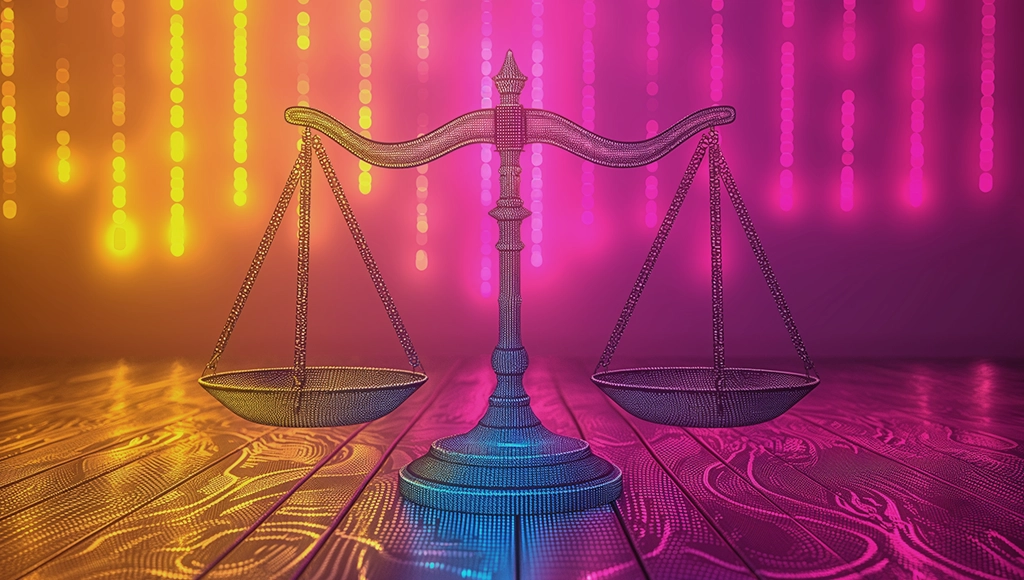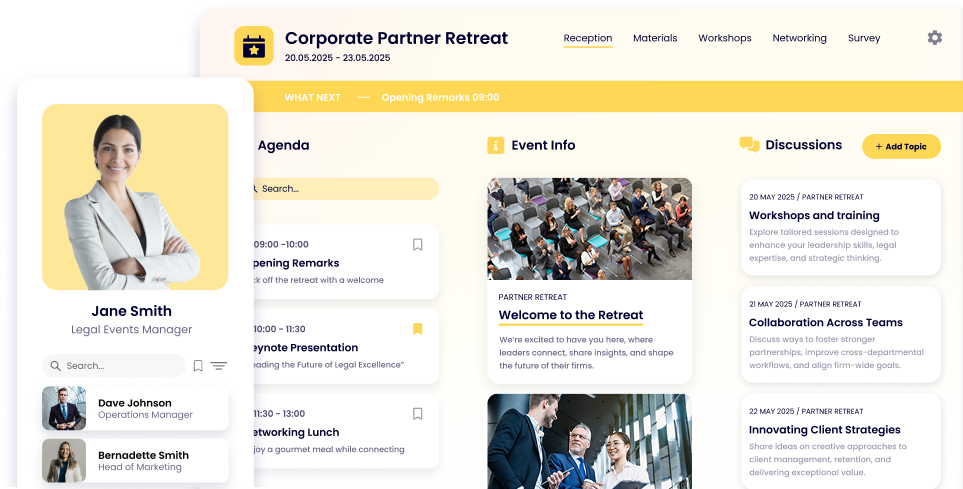What is Legal Technology? Definition + 2024 Stats

Lisa Broom | Head of Marketing

Technology has changed everything in the world. Why should law be any different? And those firms that are quick to adapt legal technology are finding they are able to work more quickly, thoroughly, and accurately than ever.
Legal technology is revolutionizing the way law firms operate, enabling them to work more efficiently and effectively. By integrating advanced tools and software, legal professionals can streamline their processes, improve client services, and stay ahead in a competitive landscape.
Whether you’re a lawyer, judge, or client, understanding and prioritizing legal technology is essential in today’s digital age. Let’s delve into the world of legal technology, explore its significance, and discover how it can transform the legal industry.
Key Takeaways
- Legal technology encompasses a wide range of tools designed to enhance efficiency and effectiveness in law firms.
- Learn what is legal technology—see its key applications, including e-signatures, document automation, and appointment scheduling.
- Technology for legal firms is crucial for remote meetings, online payments, and client intake.
- Understanding and implementing legal technology software can significantly benefit lawyers, judges, and clients alike.
- Legal technology companies are at the forefront of innovation, offering solutions that cater to various legal needs.
What Is a Legal Software System?
A legal technology software system is a suite of programs designed to help law firms manage their daily business operations. These systems offer a wide array of functionalities, from document management to client communication, making them indispensable tools in the modern legal landscape. Let’s explore some of the core components of a legal software system:
E-signatures
E-signatures have revolutionized the way legal documents are signed, eliminating the need for physical paperwork and enabling swift, secure, and legally binding signatures. This technology is particularly beneficial in expediting contract signings and other legal agreements.
Legal Technology Software
Legal technology software encompasses a variety of applications that assist law firms in managing their operations efficiently. From case management to billing and time tracking, these tools are essential for maintaining order and accuracy in legal practices.
Appointment Scheduling
Efficient appointment scheduling is crucial for law firms to manage their time effectively. Legal technology software systems offer tools that enable clients to book appointments online, reducing administrative workload and enhancing client satisfaction.
Document Automation
Document automation simplifies the creation and management of legal documents, reducing the risk of errors and saving time. This technology allows law firms to generate standardized documents quickly and accurately, ensuring consistency and compliance.
Benefits of Legal Case Management Systems
Legal case management systems offer numerous benefits to law firms, including improved organization, enhanced client communication, and streamlined workflows. By implementing these systems, law firms can increase productivity, reduce administrative costs, and deliver better client service.
Explore more about the benefits of legal technology on this Quora discussion. Here, people working in legal services and who help them adopt new software outline just how much these tools streamline workflow and make time much more cost effective.
Looking for more information?
Check out our video on how law firms can use Fliplet’s no-code system to build the ultimate legal technology that’s just right for their firm.
Why Create with Fliplet?
Fliplet provides a comprehensive video guide on creating custom legal software systems tailored to your firm’s needs. Many law firms have successfully utilized Fliplet’s platform to develop innovative solutions that enhance their operations and client engagement.
Discover how Fliplet can help you create powerful legal technology solutions here.
What Types of Legal Software Systems Do Law Firms Use?
Law firms utilize a variety of legal software systems to manage their operations and improve client services. Some popular solutions include:
- Case Management Systems: These systems help law firms manage their cases, client information, and deadlines efficiently.
- Document Management Systems: These tools assist in organizing, storing, and retrieving legal documents securely.
- Billing and Invoicing Software: Automating billing and invoicing processes, these systems ensure accurate and timely payments.
- Client Relationship Management (CRM) Software: CRM tools enable law firms to manage client interactions and improve client satisfaction.
- Time Tracking Software: These tools help law firms track billable hours and ensure accurate billing.
Learn more about our solutions for lawyers and how they can benefit your firm.
Legal Tech Types by Application and Use Case

Legal technology is applied across various areas of law, each serving a specific purpose. Here’s a breakdown of legal tech types by application and use case:
| Application | use Case |
|---|---|
| Case Law Research | Assisting lawyers in accessing and analyzing case law efficiently. |
| Contract Review | Streamlining the process of reviewing and drafting contracts. |
| Document Automation | Automating the creation and management of legal documents. |
| Due Diligence | Enhancing the process of conducting thorough investigations. |
| Electronic Evidence Management | Organizing and managing electronic evidence securely. |
| Legal Drafting | Assisting in the preparation of legal documents with precision. |
| Legal Guidance | Providing access to legal information and guidance for decision-making. |
| Legal Marketing | Enhancing visibility and engagement through targeted marketing efforts. |
| Matter Management | Managing legal matters and associated tasks efficiently. |
| Practice Management and Growth | Supporting the growth and management of legal practices. |
| Tracking Outside Counsel Spend | Monitoring and controlling external legal expenditures. |
What is Litigation Technology?
Litigation technology encompasses a range of tools and software specifically designed to support legal professionals throughout the litigation process. As the legal industry evolves, the integration of advanced technology has become crucial in managing complex litigation tasks with greater efficiency and precision.
Enhancing Case Preparation
Why is legal technology important? Probably most of all because it aids in the meticulous preparation of cases by providing robust platforms for organizing and analyzing large volumes of information.
With sophisticated document management systems, lawyers can efficiently store, categorize, and retrieve documents, ensuring that critical information is readily accessible during case preparation. These tools often include advanced search capabilities, allowing legal teams to quickly find relevant case law, statutes, and precedents, thereby strengthening their legal arguments.
Streamlining Evidence Management
Technology for legal firms helps with the management of evidence—a critical component of any legal proceeding. Litigation technology offers solutions for electronic evidence management, enabling lawyers to securely store, organize, and share digital evidence. This technology ensures the integrity and authenticity of evidence, providing a secure chain of custody and reducing the risk of tampering.
Additionally, litigation technology facilitates the review and annotation of evidence, allowing legal teams to collaborate effectively and build stronger cases.
Enhancing Trial Presentations
Trial presentations are a pivotal aspect of litigation, where the ability to communicate complex information clearly and persuasively can significantly impact the outcome of a case.
Litigation technology provides tools for creating dynamic and engaging presentations, utilizing graphics, animations, and interactive elements to enhance the delivery of legal arguments. These tools help legal professionals convey their points more effectively, making it easier for judges and juries to understand complex legal concepts.
Boosting Efficiency and Effectiveness
By integrating legal technology software for litigation, legal professionals can significantly enhance their efficiency and effectiveness in court proceedings. These technologies automate routine tasks, such as document review and evidence management, freeing up valuable time for legal professionals to focus on strategy and case analysis.
Moreover, legal technology in litigation reduces the risk of human error, ensuring greater accuracy and consistency in legal processes.
How Has Technology Changed the Legal Profession?

Legal technology has significantly transformed the legal profession, revolutionizing how services are delivered and consumed. Here are some key areas where technology has made a substantial impact:
Documents
Legal technology has drastically improved the management of documents, enhancing efficiency and accuracy in handling legal paperwork. Document management systems allow for the secure storage, organization, and retrieval of documents, reducing reliance on physical files.
Additionally, document automation tools enable the quick generation of standard legal documents, ensuring consistency and reducing the risk of errors. These advancements allow legal professionals to focus on more strategic tasks while maintaining accuracy and compliance.
Communication (Apps)
Advancements in communication apps have revolutionized the way legal professionals connect with clients and colleagues. Video conferencing tools facilitate remote meetings, enabling seamless communication regardless of location. These apps reduce the need for in-person meetings, enhancing accessibility and efficiency.
Secure messaging platforms ensure that confidential information is exchanged safely, maintaining client trust and confidentiality.
Emergency Management and Dawn Raid Streamlining
In times of crisis or unexpected regulatory inspections, technology plays a crucial role in emergency management and dawn raid streamlining. Legal technology provides tools that help law firms quickly gather and organize critical information, ensuring a swift response to emergencies.
Automated systems assist in managing communication and documentation during a dawn raid, minimizing disruptions and ensuring compliance with legal requirements. This preparedness is essential for maintaining business continuity and protecting client interests.
Client Intake Solutions
Digital client intake solutions have streamlined the process of gathering client information and managing new cases. These tools enhance efficiency by automating data collection and reducing administrative workload. Clients can easily provide necessary information through online forms, speeding up the onboarding process.
This technology improves the client experience by ensuring accurate data collection and reducing the time it takes to begin working on their cases. By leveraging client intake solutions, law firms can deliver better service and enhance client satisfaction.
Why Is Legal Technology Important?

Legal technology is essential for modern law firms to remain competitive and deliver high-quality services. Here are some reasons why legal technology is crucial:
Lawyers
For lawyers, legal technology offers tools that enhance productivity, improve accuracy, and streamline workflows. By automating routine tasks, lawyers can focus on more strategic and value-added activities.
Judges
Judges benefit from legal technology by accessing electronic case files, managing court schedules, and conducting remote hearings. This technology enhances efficiency and ensures timely and informed decision-making.
Clients
Clients benefit from legal technology through improved communication, transparency, and access to legal services. Technology enables clients to engage with law firms more conveniently and receive timely updates on their cases.
Discover how certain apps can be important for lawyers, judges, and clients in our 12 Apps to Boost Your Community Engagement article.
Legal Technology Companies
Legal technology companies are at the forefront of innovation, developing solutions that address the unique needs of the legal industry. These companies offer a wide range of tools and services, from case management systems to AI-powered legal research platforms.
Why Is Technology Needed for Legal Firms?
Technology is crucial for legal firms to improve efficiency, enhance client services, and remain competitive. By leveraging technology, law firms can streamline their operations, reduce costs, and deliver better outcomes for clients.
How to Implement New Tech for Your Team?
Implementing new technology requires careful planning and execution. Here are some steps to ensure successful implementation:
- Assess Needs: Identify the specific needs and challenges of your law firm.
- Research Solutions: Explore different legal technology solutions and evaluate their suitability.
- Engage Stakeholders: Involve key stakeholders in the decision-making process.
- Plan Implementation: Develop a detailed implementation plan, including timelines and resources.
- Provide Training: Ensure that your team receives adequate training on the new technology.
- Monitor Progress: Continuously monitor the implementation process and address any issues.
Legal Technology News
Staying informed about the latest legal technology news is essential for law firms to remain competitive and up-to-date with industry trends.

Only recently, we’ve seen an explosion in legal technology:
- The IMF estimates 40% of jobs could be affected by AI, in particularly white collar jobs—especially relevant for lawyers.
- 85% of legal departments believe AI can be applied to the work they do.
- This is driving the legal tech market industry, which is expected to grow to $35 billion a year by 2027.
Here are some key trends and developments in legal technology:
Invest in Legal Technology Solutions
Investing in legal technology solutions is crucial for law firms to improve efficiency, reduce costs, and enhance client services. According to recent statistics, law firms that invest in technology are more likely to achieve better financial performance and client satisfaction.
Top Legal Technology Conferences to Learn from the Best in 2024
Attending legal technology conferences is an excellent way to stay informed about the latest trends and innovations in the legal industry.
These events provide valuable opportunities to learn from industry experts, network with peers, and discover new tools and solutions that can enhance your legal practice. Here are some notable legal technology conferences to consider attending in 2024 and 2025:
2024 Conferences
1. Legaltech New York (LTNY)

Date: January 30 – February 1, 2024
Location: New York, NY
Legaltech New York is one of the most prominent legal technology conferences in the world. It brings together legal professionals, technology experts, and innovators to explore cutting-edge technologies and solutions that are transforming the legal industry.
Attendees can participate in insightful sessions, panel discussions, and workshops covering topics such as artificial intelligence, e-discovery, cybersecurity, and more. This conference offers a unique opportunity to connect with industry leaders and gain valuable insights into the future of legal technology.
2. ABA TECHSHOW

Date: March 6-9, 2024
Location: Chicago, IL
The ABA TECHSHOW, organized by the American Bar Association, is a premier event for legal professionals interested in technology and practice management. The conference features a diverse range of sessions and workshops focused on the latest legal technology tools and trends. Topics include practice management software, cybersecurity, virtual law firms, and emerging technologies like blockchain.
The TECHSHOW Expo Hall showcases a wide array of technology products and services designed to improve law firm operations. Attendees will have the chance to network with peers, engage with experts, and explore innovative solutions for their legal practice.
3. ILTACON 2024

Date: August 18-22, 2024
Location: Orlando, FL
ILTACON, organized by the International Legal Technology Association (ILTA), is a comprehensive conference for legal technology professionals. This event brings together a community of experts to share insights, strategies, and solutions for improving the delivery of legal services.
ILTACON offers a diverse range of sessions, including technical workshops, product demonstrations, and discussions on topics such as data analytics, information governance, and artificial intelligence. With its focus on practical solutions and collaboration, ILTACON is an essential conference for legal professionals seeking to leverage technology to enhance their practices.
2025 Conferences
1. Global Legal Tech Summit

Date: February 12-14, 2025
Location: London, UK
The Global Legal Tech Summit is a leading event for legal professionals worldwide, focusing on the intersection of technology and law. This conference brings together global leaders to discuss innovations in legal technology, including AI-driven solutions, blockchain applications, and digital transformation strategies.
Attendees can expect engaging keynote speeches, interactive workshops, and networking sessions that foster collaboration and knowledge sharing.
2. Legal Innovation and Tech Fest

Date: June 10-11, 2025
Location: Sydney, Australia
The Legal Innovation and Tech Fest is a vibrant event that celebrates the advancements in legal technology and innovation. It features sessions on emerging technologies, change management, and innovation strategies that drive success in the legal sector.
This conference is an excellent opportunity for legal professionals to explore new ideas, share experiences, and learn about the tools and technologies shaping the future of legal practice.
3. Future Lawyer Summit

Date: September, 2025
Location: Boston, Massacheusetts
The Future Lawyer Summit focuses on the challenges and opportunities presented by the digital transformation of the legal industry. This conference offers a platform for legal professionals to explore topics such as legal AI, cybersecurity, and data privacy.
Attendees will benefit from thought-provoking discussions, case studies, and networking opportunities with peers and industry leaders, all aimed at preparing law firms for the future.
Discover how Fliplet can boost your Legal Technology

Fliplet gives you the ability to create legal technology solutions without a single line of code. That gives you the power to build anything you need, all without high development costs.
Explore our solutions and see how Fliplet can transform your legal practice. Discover more.
FAQs
What is a legal technology professional?
A legal technology professional is an expert who specializes in implementing and managing technology solutions for law firms, helping them improve efficiency and client services.
What types of legal software systems do law firms use?
Law firms use various legal software systems, including case management, document management, billing, and client relationship management (CRM) software.
How has technology changed the legal profession?
Technology has transformed the legal profession by enabling remote meetings, online payments, virtual offices, and enhanced client communication.
What are some legal technology companies?
Legal technology companies include providers of case management systems, AI-powered legal research platforms, and digital client intake solutions.
What is a legal technology conference?
A legal technology conference is an event where legal professionals gather to learn about the latest trends and innovations in legal technology.
How can technology benefit your legal department?
Technology can benefit your legal department by streamlining operations, reducing costs, and enhancing client services.
How can legal technology improve client services?
Legal technology improves client services by enabling better communication, transparency, and accessibility to legal services.





